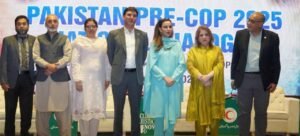Sherry Rehman Calls for ‘Pakistan’s Own Conference of Parties’ to Build Climate Resilience
Islamabad -3 November, 2025 (Adnan Hameed) : Senator Sherry Rehman, Chief Guest and Keynote Speaker at the Pakistan Red Crescent Society’s Pre-COP30 conference titled “From Policy to Practice”.

“This is a crucial convening,” she said. “Climate change is worsening, and the crisis will only gather higher velocity. Without urgent adaptation, the World Bank estimates that Pakistan could lose 18–20% of its GDP by 2050. So I ask: at COP30, thirty years later, where do we stand today? What are we giving and what are we taking from nature?”
She proposed convening “Pakistan’s own Conference of Parties—comprising provinces, experts, and people”— to intensify data-sharing, local innovations, public private partnerships across the federation. “Every province has its own share of challenges, from drought-hit Balochistan to the deforested valleys of Chitral to flood hit provinces of Sindh, KP and Punjab. People are still struggling with livelihood challenges in each. Every province has a different topography and different challenge, from mountain to delta, but every province has to act based on its access to resources, both in terms of capacity and finance.”
Touching on global finance, she questioned: “Where is the $300 billion from the New Collective Quantified Goal (NCQG)? What are developed countries contributing to the South? Countries should not have to compete internationally for climate funds —it is a fundamental right. Even early warning systems cost more than we can afford, and these are fundamental to survival now.” Developed countries should ideally be also asked to submit their Internationally Determined Contributions to the countries who have a negligible carbon footprint. Debt swaps and financial guardrails for the vulnerable must be built because, simply put, our house is burning at 53 C every summer .”
Senator Rehman underscored that Pakistan’s Nationally Determined Contributions (NDCs) 3.0 have been updated with ambitious goals, including a target to cut projected greenhouse gas emissions by half—17% through domestic efforts and 33% conditional on international finance—requiring $565.7 billion by 2035. “Between 2021 and 2025, Pakistan has already achieved a 37% emissions reduction without external aid,” she noted, but cautioned that the international climate finance conversation must translate into tangible relief for those on the frontlines. “The projected total cost of climate inaction in Pakistan is estimated at $250 billion by 2030 and $1.2 trillion by 2050,” she warned. “The people suffering these losses cannot wait for conference outcomes. Brazil is right to demand that adaptation be at the core of COP30—Pakistan’s needs must also be addressed.”
She underlined the urgent need to involve the private sector and mobilise innovative financial solutions: “Businesses must be part of building holistic resilience. We need some kind of financial mobilisation, because no matter how many cooling centres you build, you can’t cool a country where temperatures reach 53°C in Sindh and Balochistan. We also need to take responsibility for what we can do in terms of delivering climate action at home, in terms of providing sanitation and clean water. Right now we have very high pollution in our air and water, which are not the doing of any global emitter.”
Senator Rehman stressed the low recycling rate—“Pakistan only recycles 1% of its plastic, while globally it’s just 9%. Plastic is choking our drains, killing resilience, and worsening flooding”—and called air pollution a “serial killer,” responsible for over 128,000 deaths annually. She noted that “the Indus is now the second most polluted river in the world,” underscoring the interconnected crisis of air, water and land degradation.
Calling for localised and science-based solutions, Senator Rehman said: “This is not the era of big dams, as even the funding is not available for existing cost overruns on the projects already launched. We need to move towards innovation at scale —plastics converted into usable materials, students leading new models, and nature-based solutions such as mangrove monetisation through carbon credits in the Delta Blue project.”
Senator Rehman stressed that “resilience is not a slogan” but a lived reality built on clean water, sustainable livelihoods, and safer cities. “A clean city faces fewer health crises—less dengue, less malaria, less heat stress. The WASH sector is critical for de-risking our communities.”
Senator Rehman emphasised that the global climate crisis has deepened the divide between the ‘haves and have-nots’, with the Global South bearing the brunt of a crisis it did not create. “Our rivers, our monsoon, have taken on a monster quality. The floods of 2022 and now 2025 have shown that it is always the poorest who are hit the hardest. Futures are stolen when livelihoods, homes and hopes are washed away,” she said.
Senator Rehman gave a message of hope and agency, said “Volunteers, you are not powerless. You can be agents of change. Reduce your carbon and plastic footprints. Plant trees, nurture them to maturity, and become part of restoration and nature-based solutions. Pakistan must present itself at COP30 not as a victim, but as an equitable voice that leads the Global South—just as we did in 2022.” Senator Rehman commended the Red Crescent Society for its tireless work, she praised the organisation’s growing network of over 700,000 volunteers across Pakistan, describing them as “the heart, core and backbone of disaster response.”






